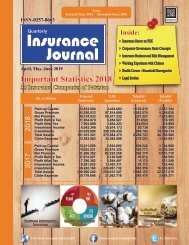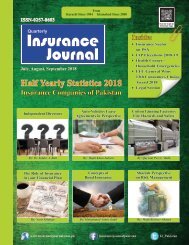Insurance Journal (3rd Quarter 2021)
You also want an ePaper? Increase the reach of your titles
YUMPU automatically turns print PDFs into web optimized ePapers that Google loves.
Legal Section
of revival, Ramesh G. Bhatia v. Gopala
Gases P. Ltd., (1994) 3 Comp LJ 435
(Del);
6. Where there was suspension of
business for over a year, the number of
members was reduced to less than two, all
directors but one were absconding and
assets were taken over by the lending
institution, the petition by the sole
remaining director for winding up was
admitted. The argument of the lending
institution that the winding up was being
restored to, to escape the remaining
liability to the institution was not
accepted. Surendra Kumar Pareek v.
Shree Guru Nanak Oils P. Ltd. (1995) 82
Com Cases 642 (Raj).
7. Where various banks and financial
institutions refused to advance term loans
on account of the antecedents of the
managing director, and by change of
management also, the position of the
company could not be revived. Kerala
S t a t e I n d u s t r i a l D e v e l o p m e n t
Corporation v. Poonmudi Tea Pack Ltd.
(1988) 63 Com Cases 575 (1987) 3 Comp
LJ 180 (Ker).
8. The directors of a company which had
cheated investors, banks and financial
institutions were also involved in the
respondent company. Statutory notice
was simultaneously given to it also with
nor reply. Advertisement also made
without any objection. No business was
done by the company since incorporation.
Registrar of Companies v. Amit Inter
Chemicals P. Ltd., (2003) 42 SCL 743
(All).
11. In the case of Registrar of Companies
v. Bihar Wire and Wire Products (P.) Ltd.,
(1975) 45 Com Cases 194 (Pat), the court
pointed out a long line of decision on the
question of winding up which establish
among others, the following propositions
of law:
1. That the mere fact that business has not
been commenced within a year or that
business
has been suspended for a whole year or
more by itself is not a ground for a court to
order winding up, although they give the
jurisdiction to the court to do so.
2. That it has to be found out whether the
non-commencement or suspension of
business was for some good reason
accounting for it.
3. That the fact of non-commencement or
suspension of business is an evidence
which indicates that the company has no
intention of carrying on business or that it
is not likely to do so.
4. That the decisive question is whether
there is a reasonable hope of the company
commencing or resuming business and
doing it at a profit, and whether the
substratum of the company has
disappeared.
5. It has to be clearly established that the
company was incorporated for the sole
purpose that could no longer be achieved.
Winding up is not appropriate where the
directors in the exercise of their
managerial powers decide to dispose of
the main but not the sole business of the
company. Strong v. J. Brough & Son
(Stratsfield) Pty. Ltd., (1991) 4 ACSR 296
(SC of New South Wales).
6. Winding up order was passed: Where
the substratum of the company was gone
or its only business had become
impossible; Re, Haven Gold Mining Co.,
(1882) 20 Ch D 151; Re, German Date
Coffee Co., (1881-5) All ER Rep 372:
(1882) 20 Ch D 169; Amalgamated
Syndicate, Re, (1897) 2 Ch 600 : (1895-9)
All ER Rep 340; Re, Taldua Rubber Co.
Ltd., (1946) 2 All ER 763; Cf. Re, Kiston
& Co. Ltd., (1946) 1 All ER 435; Re,
Perfectair Holdings Ltd., 1990 BCLC 423
(Ch D); In Re, H.C. Insurance Society
L t d . , ( 1 9 6 0 ) 6 5 C W N 6 8 . S e e
K u m a r p u r a m G o p a l a k r i s h n a n
Ananthakrishnan v. Burdwan-Cutwa rly.
Co. Ltd., (1978) 48 Com Cases 211 (Cal)
and on appeal at page 611 followed in
Bombay Cas Company Ltd. V. Hindustan
Mercantile Bank Ltd., (1980) 50 Com
Cases 202 (Cal); Akola Electric Supply
Co. Ltd., In Re, (1962) 32 Com Cases 215
: AIR 1962 Bom 133; Davco Products
Ltd. V. Rameswarlal Sadhani, AIR 1954
Cal 195 (Three was no reasonable chance
of the company starting business again).
But not where the substratum had not
completely gone and the majority
shareholders opposed. See Mohanlal
Dhanjibhai Mehta v. Chunilal B. Mehta,
(1962) 32 Com Cases 970 : AIR 1962 Guj
269; Janbazar Manna Estates Ltd., Re,
(1931) 1 Com Cases 243 : AIR 1931 Cal
692; George v. Athimattam Rubber Co.
Ltd., (1965) 35 Com Cases 17 (Ker).
12. So far as other crucial and pivotal
factors required significant consideration
is with regard to the substratum of a
company that seems to have gone when
(a) the subject matter of the company is
disappeared, or (b) the object for which it
was incorporated has substantially
collapsed, or (c) it is impossible to carry
on the business of the company except at a
loss and there is no reasonable hope of
trading at a profit. But, where a company
sold its undertaking, if there is still some
business which it can carry on, it cannot
be said that the substratum had
disappeared. Ref: George v. Athimattam
Rubber Co. Ltd., (1965) 35 Com Cases
17. Where the company in question had
totally disappeared with nobody
attending its office and high officials were
absconding and the company's office
being under lock, no one received notice
and even to newspaper announcement
there was no response from any quarter,
naturally it was a fit case for an order of
winding up. Ref: Bhartiya Gramin Vikas
Vitta Nigam Ltd. Re, (2000) 27 SCL 249
(All).
20. As a result of above discussion, it is
ordered that the respondent company be
wound up. Official Assignee is appointed
Official Liquidator. The Company shall
submit the statement of affairs to the
Official Liquidator in accordance with
law. The Official Liquidator after
complying with all requisite formalities
shall submit the report.
MH/S-82/Sindh
Petition allowed.
Insurance Journal July, August, September 2021
42
Find us at: www.insurancejournal.com.pk — www.facebook.com/insurancejournalpakistan

















